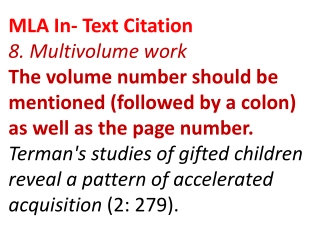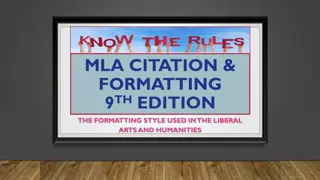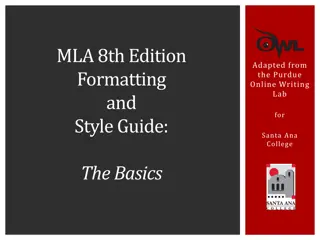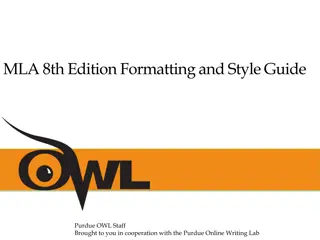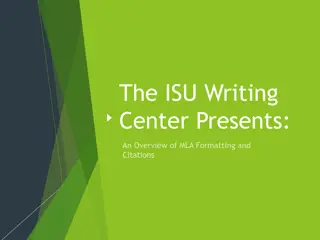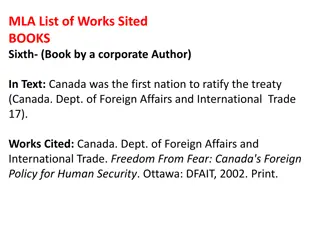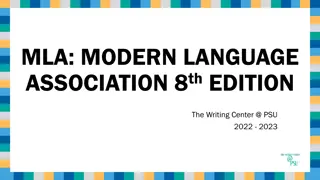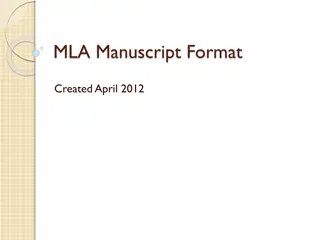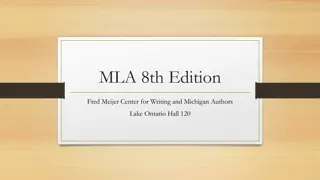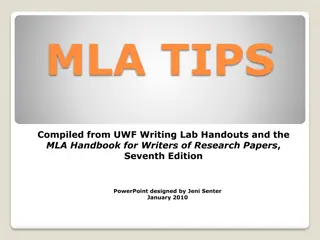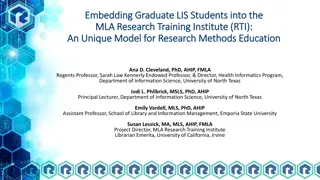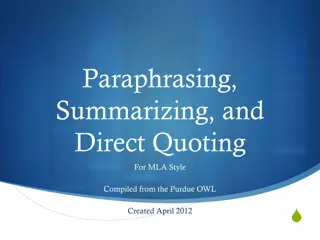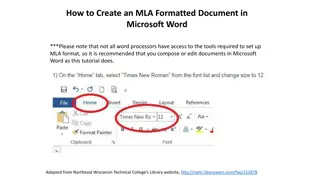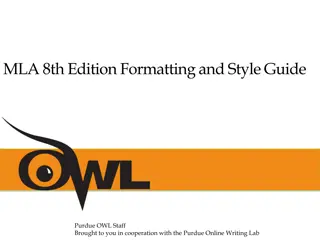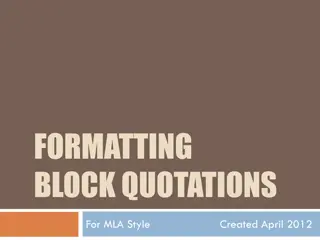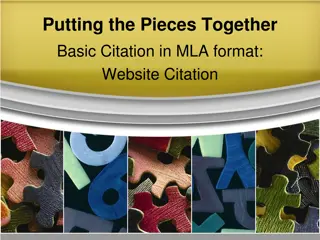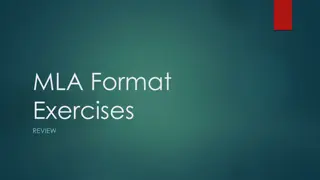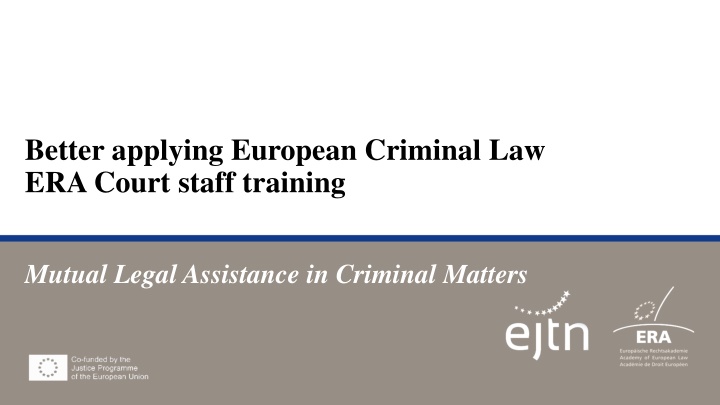
Enhancing Mutual Legal Assistance in European Criminal Law
Explore the concept of Mutual Legal Assistance (MLA) in European Criminal Law, covering the relationship between legal instruments, administrative details, execution processes, and special provisions like video conferencing. Understand the main instruments and protocols involved, along with grounds for refusal and requirements like double criminality. Dive into the complex web of legal instruments applicable to judicial cooperation in criminal matters between Member States.
Download Presentation

Please find below an Image/Link to download the presentation.
The content on the website is provided AS IS for your information and personal use only. It may not be sold, licensed, or shared on other websites without obtaining consent from the author. If you encounter any issues during the download, it is possible that the publisher has removed the file from their server.
You are allowed to download the files provided on this website for personal or commercial use, subject to the condition that they are used lawfully. All files are the property of their respective owners.
The content on the website is provided AS IS for your information and personal use only. It may not be sold, licensed, or shared on other websites without obtaining consent from the author.
E N D
Presentation Transcript
Better applying European Criminal Law ERA Court staff training Mutual Legal Assistance in Criminal Matters
Content: The concept of Mutual Legal Assistance (MLA) Relationship between legal instruments for judicial cooperation in criminal matters Administrative details: transmission channels, forms Execution of the MLA - Time limits Special provisions for hearings by videoconference and telephone conference 2
The concept of Mutual Legal Assistance (MLA) The main instruments based on the principle of mutual legal assistance include the 1959 Convention and its protocols, supplemented by the Schengen Agreement and the 2000 Convention and its protocol The mutual assistance instruments and their protocols cover mutual assistance in general but also contain rules on specific forms of mutual assistance such as the interception of telecommunications or the use of videoconferencing Mechanism based on mutualassistance between the requesting and the requested competent authorities Grounds for refusal (article 2 of the 1959 Convention) - the request concerns an offence which the requested party considers a political offence, an offence connected with a political offence, or a fiscal offence or if the requested party considers that execution of the request is likely to prejudice the sovereignty, security, ordre public or other essential interests of its country Double criminality normally requested when executing the LoR Different provisions on locus regit actum (1959 Convention) and forum regit actum (2000 Convention) regarding the execution of the LoR 3
Relationship between legal instruments for judicial cooperation in criminal matters Identify the legal instrument applicable to the two MS involved in the judicial cooperation process Pay particular attention to the sequence of the legal instruments and their scope of application, as they replace or supplement other legal instruments in relation to MS e.g. Directive 2014/41/EU regarding EIO is applicable as of 22.05.2017 for all MS with the exception of Denmark and Ireland (related only to taking on evidence) The relationship with other legal instruments is usually mentioned at the beginning or in the final provisions of the legal instrument in question e.g. article 34 of the Directive 2014/41/EU regarding the EIO, article 1 of the 2000 Convention Verify the table of the ratifications for each legal instruments (the legal instrument is only applicable if ratified by the two states involved ). Of course, there are declarations and reservations made .verify them too because they are important to know how the MLA will be executed by the Requested State!!! The full list of the Conventions (signatures, ratifications, declarations and more) is available on the Treaty office of the CoE s website -> https://www.coe.int/en/web/conventions/full-list For the 2000 Convention and its protocol check the EJN website -> https://www.ejn- crimjust.europa.eu/ejn/# 4
Relationship with other legal instruments for judicial cooperation in criminal matters cont. 5
Administrative details: transmission channels, forms Transmission channels Requests for mutual legal assistance shall, as a general rule, be transmitted directly between the competent judicial authorities of the Requesting and Requested State (article 6 para. 1 of the 2000 Convention). Exceptions e.g. article 6 para. 3 of the 2000 Convention for UK and Ireland (Central Authority) Article 4 of the Second Additional protocol to the 1959 Convention (MoJ to MoJ) => exception para.2 which allows direct contact between judicial authorities By any means capable of producing a written record Forms No mandatory form to use for cooperation provided in the legal instruments for MLA Minimum requirements for the content of the request An LoR form is provided on the EJN website (Compendium) in all EU languages https://www.ejn-crimjust.europa.eu/ejn/CompendiumChooseCountry/EN 6
LoR form 7
Execution of the MLA Time limits The requested party shall execute in the manner provided for by its law any letters rogatory relating to a criminal matter and addressed to it by the judicial authorities of the requesting party and to afford each other the widest measure of mutual assistance (articles 1 & 3 of the 1959 Convention) locus regit actum The 2000 Convention shifted the balance, and so the authorities of the requested state shall comply with the formalities and procedures indicated by the authorities of the requesting state provided that they are not contrary to fundamental principles of law in the requested state or where the Convention itself expressly states that the execution of requests is governed by the law of the requested Member State (article 4 of the 2000 Convention) forum regit actum As a general rule, the requests shall be executed as soon as possible and if possible, within the deadlines indicated by the requesting authority If it is foreseeable that the deadline set by the requesting state for executing its request cannot be met the authorities of the requested state shall promptly indicate the estimated time needed for execution of the request 8
Special provisions for hearings by videoconference and telephone conference Hearing by videoconference => article 9 of the Second Additional Protocol to the European Convention on Mutual Assistance in Criminal Matters (08.11.2001) Hearing by telephone conference => article 10 of the Second Additional Protocol to the European Convention on Mutual Assistance in Criminal Matters Hearing by videoconference => article 10 of the 2000 Convention Hearing by telephone conference => article 11 of the 2000 Convention 9
Special provisions for hearing by videoconference and telephone conference cont. The person is in one Member State s territory and has to be heard by the judicial authorities of another Member State. It is not desirable or possible for the person to be heard or to appear in the territory of the requesting MS in person The requested Member State shall agree to the hearing by videoconference provided that the use of the videoconference is not contrary to the fundamental principles of its law Measures for the protection of the person to be heard shall be agreed, where necessary, between the competent authorities of the requesting and the requested Member States The hearing shall be conducted directly by, or under the direction of, the judicial authority of the requesting party in accordance with its own laws The judicial authority of the requested Member State shall draw up minutes indicating the date and place of the hearing, the identity of the person heard, the identities and functions of all other persons in the requested Member State participating in the hearing, any oaths taken and the technical conditions under which the hearing took place, and the document shall be forwarded by the competent authority of the requested Member State to the competent authority of the requesting Member State 10

